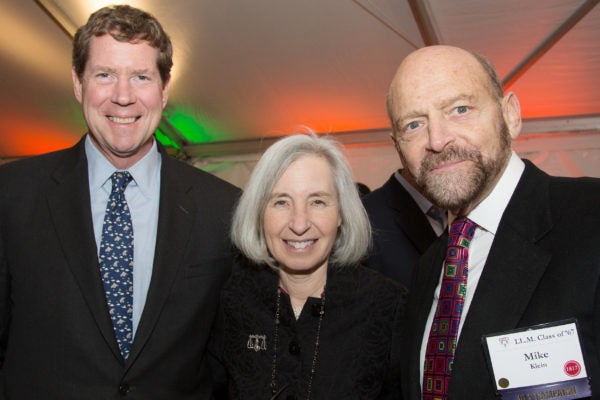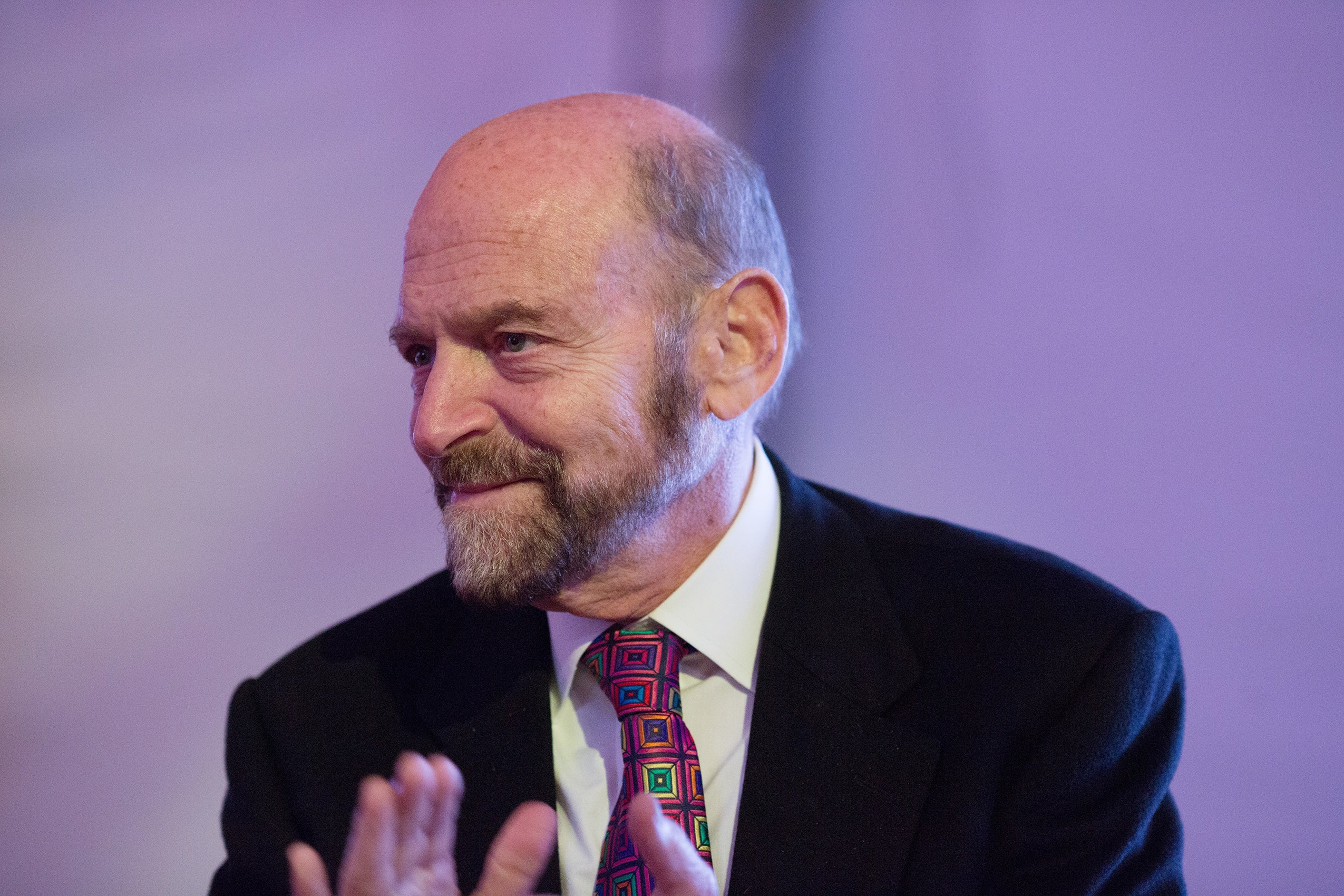Harvard Law School and the Berkman Center for Internet & Society at Harvard University are pleased to announce that Michael R. Klein LL.M. ’67 has made a generous gift of $15 million to the Berkman Center. The Law School recently recognized the gift with a renaming celebration, and the Center is now known as the Berkman Klein Center for Internet & Society.
“This gift helps ensure that Harvard Law School will remain at the forefront of problem solving as we confront and take advantage of the global and digital future,” said Martha Minow, Morgan and Helen Chu Dean of the Law School. “In 1997, a remarkably farsighted gift from the late Jack N. Berkman ’29 and Lillian R. Berkman created the Berkman Center for Internet & Society. The scope of the Center’s work and the global reach of the Internet have grown dramatically over the last two decades. Now, as the Center approaches a third decade of innovation, we are deeply grateful for Mike Klein’s gift, which will build on the Berkman family’s generosity to sustain the Center’s leadership position and allow for continued exploration in the years to come.”
Klein’s gift is the largest individual gift to the Law School’s Campaign for the Third Century to date. The Campaign is part of the University-wide, $6.5 billion Harvard Campaign that runs until 2018.
“A generous Brandeis Fellowship enabled me to attend Harvard, and that education opened extraordinary opportunities for me,” Klein said. “Now, the ability to give back to Harvard Law School is a privilege that I am deeply grateful for, particularly because my contribution can be directed to an exciting, entrepreneurial Center that is in the vanguard of cyberspace research.”
A Center—and a gift—for the future
The Berkman Klein Center for Internet & Society is dedicated to exploring, understanding, and shaping the development of the digitally networked environment. A diverse, interdisciplinary community of scholars, practitioners, technologists, policy experts, and advocates, the Center has tackled the most important challenges of the digital age while keeping a focus on tangible real-world impact in the public interest. Its faculty, fellows, staff, and affiliates conduct research, build tools and platforms, educate others, and form bridges and facilitate dialogue across and among diverse communities.
At a time when the opportunities and challenges of an increasingly networked world abound and digital transformations are profoundly shaping the future of society, this gift will not only provide vital core support, but will also allow the Center to start new explorations, launch innovative programs, and incubate novel collaborations both nationally and internationally.
“Mike Klein’s extraordinary commitment joins the Berkman family’s in allowing us the rare and precious liberty to plan and build according to imagination and conscience,” said Jonathan Zittrain ’95, the Center’s co-founder and current faculty director. “The Center was premised on the idea that the Internet’s design invites contribution, and that difficult problems can be understood and solved through thoughtful and sensitive combinations of technical and institutional innovations, both public and private.”
“In particular, this gift will help us to build new and enhanced interfaces between the worlds of computer science, engineering, law, governance, and policy through powerful research initiatives, educational programs, and outreach efforts, bringing together the best know-how from both academia and practice, and engaging the next generation of technology and policy leaders and makers,” said Urs Gasser LL.M. ’03, professor of practice at HLS and executive director of the Berkman Klein Center.

The Center has catalyzed dozens of initiatives concerning the Internet, particularly in the areas of law and policy, education and public discourse, and access to information. These endeavors include rigorous academic research with the aim of achieving tangible, real-world impact, such as the recent high-profile “Don’t Panic: Making Progress on the ‘Going Dark’ Debate” report released by the Center’s Berklett Cybersecurity project, which garnered widespread attention from policymakers and the media. Other key initiatives include building tools that preserve and monitor access to information, such as Amber, an open source tool that preserves content and prevents broken links; the Lumen database, which serves as the definitive source for worldwide requests to remove content from the Internet; and Internet Monitor, a project that aims to evaluate, describe, and summarize the means, mechanisms, and extent of Internet content controls and other activity around the world.
The Center is also committed to building bridges and fostering connections among diverse communities and perspectives, such as by incubating the Global Network of Internet and Society Research Centers (NoC), a collaborative initiative among academic institutions with a focus on interdisciplinary research on the development, social impact, policy implications, and legal issues concerning the Internet.
The Cyberlaw Clinic, in which HLS students provide pro bono legal services and earn course credit, is also part of the Center. The clinic was the first of its kind, and it continues its tradition of innovation in its areas of practice. Students are supervised by experienced and licensed attorneys as they provide service to clients on issues relating to the Internet, new technology, and intellectual property. Students also work with clients to shape the law’s development through policy and advocacy efforts.
In 2008, the Center was elevated from a research center at the Law School to a University-wide interfaculty Initiative. Since then, the Center has expanded to include more than 500 community members from 40 countries. This growth stems from both an expansion of the Center’s human network and its entrepreneurial spirit and willingness to take risks in pioneering new areas of study. With support from Mike Klein, as well as that of other generous donors and foundations, the Berkman Klein Center aims to continue to grow in areas where it can have the biggest impact.
Philanthropy with purpose
Klein received his undergraduate and law degrees from the University of Miami before earning an LL.M. at Harvard Law School in 1967. From 1974 through 2005, he was a partner at Wilmer Cutler Pickering Hale and Dorr (now WilmerHale). In 2004, he made a gift to endow the Michael R. Klein Professorship of Law, a chair held by Professor Randall L. Kennedy. Klein has also generously supported the Law School’s Annual Fund and the Charles Hamilton Houston Institute for Race and Justice, and he serves on the HLS Dean’s Advisory Board.
Today, Klein is focused on business and non-profit ventures. He is chairman of the Sunlight Foundation, a non-partisan, non-profit group that he co-founded in 2005 to bring greater transparency to the workings of Congress. The Sunlight Foundation has participated in several Berkman Center events. Klein is also the chairman of CoStar Group Inc., a publicly traded provider of commercial real estate information that he co-founded in 1987. In 2013, he established Gun Violence Archive, Inc., a not-for-profit corporation that provides free online public access to information about gun-related violence in the United States. Additionally, he is vice chairman of the board and lead outside director for the Tutor-Perini Corporation, a major general contractor.
Klein’s non-profit commitments include service as chair of the board of trustees for the Shakespeare Theatre Company, a member of the boards of directors for both the American Himalayan Foundation and the NAACP Legal Defense & Education Fund, and a trustee of The Aspen Institute and the Aspen Music Festival and School.
